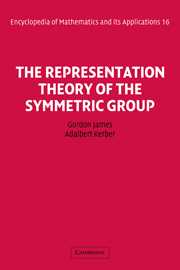Book contents
- Frontmatter
- Contents
- Editor's Statement
- Section Editor's Foreword
- Introduction by G. de B. Robinson
- Preface
- List of Symbols
- The Representation Theory of the Symmetric Group
- Chapter 1 Symmetric Groups and Their Young Subgroups
- Chapter 2 Ordinary Irreducible Representations and Characters of Symmetric and Alternating Groups
- Chapter 3 Ordinary Irreducible Matrix Representations of Symmetric Groups
- Chapter 4 Representations of Wreath Products
- Chapter 5 Applications to Combinatorics and Representation Theory
- Chapter 6 Modular Representations
- Chapter 7 Representation Theory of Sn over an Arbitrary Field
- Chapter 8 Representations of General Linear Groups
- Appendix I Tables
- Appendix II Notes and References
- Index
Chapter 7 - Representation Theory of Sn over an Arbitrary Field
Published online by Cambridge University Press: 05 December 2015
- Frontmatter
- Contents
- Editor's Statement
- Section Editor's Foreword
- Introduction by G. de B. Robinson
- Preface
- List of Symbols
- The Representation Theory of the Symmetric Group
- Chapter 1 Symmetric Groups and Their Young Subgroups
- Chapter 2 Ordinary Irreducible Representations and Characters of Symmetric and Alternating Groups
- Chapter 3 Ordinary Irreducible Matrix Representations of Symmetric Groups
- Chapter 4 Representations of Wreath Products
- Chapter 5 Applications to Combinatorics and Representation Theory
- Chapter 6 Modular Representations
- Chapter 7 Representation Theory of Sn over an Arbitrary Field
- Chapter 8 Representations of General Linear Groups
- Appendix I Tables
- Appendix II Notes and References
- Index
Summary
Although much information about the p-modular representations of Sn can be obtained in terms of characters, difficulties remain which apparently cannot be overcome by character-theory arguments alone. More results are found by examining the representation modules of Sn. It is useful to have a module for each ordinary irreducible representation. Such modules have already been constructed—the left ideals of the group algebra in Section 3.1—but it is easier to work in terms of Specht modules, which will be defined in the first section of this chapter. Each left ideal of Section 3.1 is isomorphic to some Specht module, and so every result could be interpreted in terms of the group algebra. Essentially, the advantage enjoyed by the method of examining Specht modules, modulo p, over that of looking at the p-modular components of the ordinary characters is that the order of the factors in a composition series can be noted.
Specht Modules
As the new approach to the representation theory of Sn is to be characteristic-free, the first problem is to construct an Sn-module which has the same definition over every field. Certainly permutation modules have this property. It is reassuring to see that the ordinary irreducible representations of Sn have been found in Chapter 2 by looking inside the permutation modules of Sn on Young subgroups. It should be profitable, therefore, to study these permutation modules first, and try to find a submodule (which will be called a Specht module) which is a generalization of the ordinary irreducible representation arising from the partition β.
- Type
- Chapter
- Information
- The Representation Theory of the Symmetric Group , pp. 294 - 318Publisher: Cambridge University PressPrint publication year: 1984



